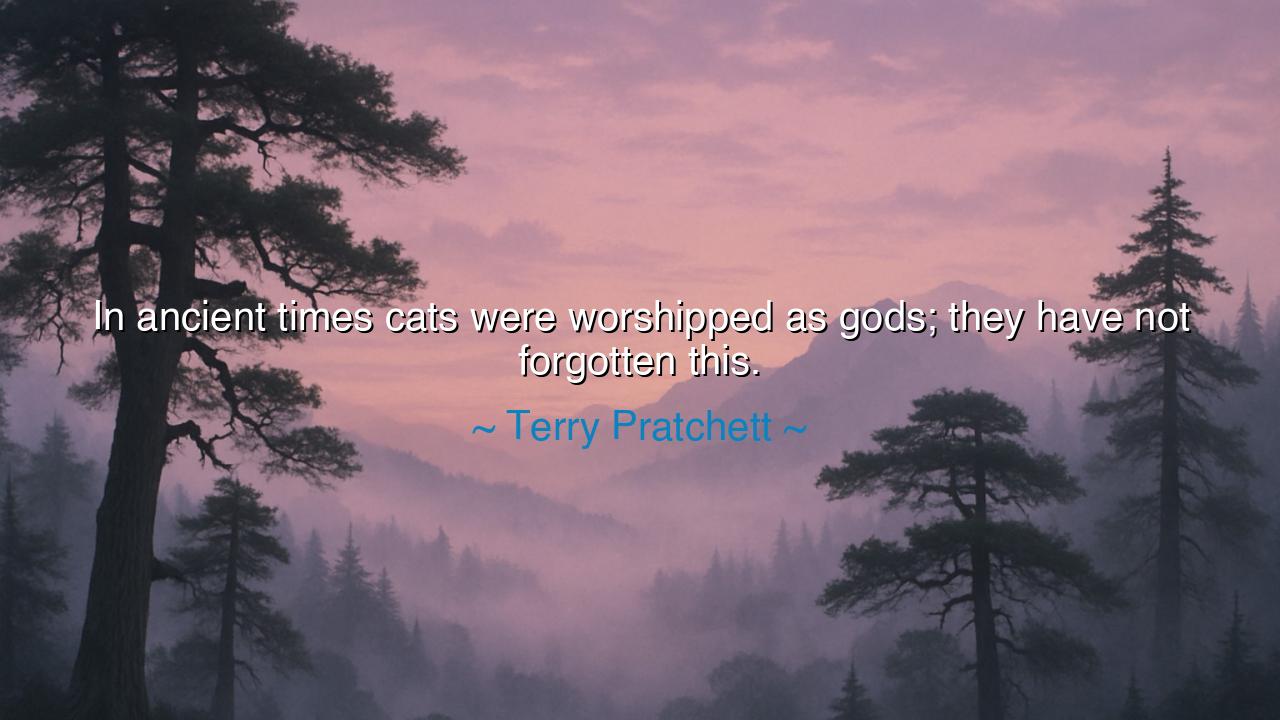
In ancient times cats were worshipped as gods; they have not






Terry Pratchett, the wise jester of modern myth, once wrote with sly humor and hidden reverence: “In ancient times cats were worshipped as gods; they have not forgotten this.” At first these words provoke laughter, for anyone who has lived with a cat knows its regal airs and haughty indifference. Yet beneath the jest lies an eternal truth: the cat carries within its silent gaze the memory of temples, the whisper of incense, the aura of divinity. Where man has crowned and dethroned countless gods, the cat has remained steadfast in its own quiet sovereignty.
The origin of this saying reaches back to the sacred sands of Egypt, where the cat was honored not merely as a companion, but as a divine being. The goddess Bastet, adorned with the head of a lioness or a domestic cat, was worshipped as protector of home, fertility, and grace. To harm a cat was sacrilege, punishable by death. Pharaohs kept them close, and families wept bitterly at their passing. When Pratchett observed that cats have not forgotten this ancient worship, he spoke truly, for their very posture, their unhurried confidence, still carries the remembrance of their godhood.
To live with a cat is to live under a monarchy of mystery. Dogs may bow, eager to serve, but the cat commands without command, rules without decree. It enters a room as though it owns it, accepts affection as tribute, and withholds its presence as it pleases. In this it mirrors the gods themselves: aloof yet near, unknowable yet intimate. Pratchett, with his gift of wit, captured what sages have long understood: the cat remembers. It remembers temples where it was adored, granaries where it was guardian, and altars where it was divine.
History itself offers us living proof. When Napoleon marched into Egypt, he discovered that even the French soldier’s musket was less feared than the wrath of villagers should a cat be harmed. The memory of reverence endured across centuries, carried not only in human custom but in feline bearing. Even today, when a cat sits high upon a shelf, gazing down with indifferent majesty, it echoes the statues of Bastet in her temple—serene, untouchable, eternal.
But Pratchett’s words are not merely about cats; they are also about humanity. They remind us how creatures that share our homes can embody our ancient connections to mystery and reverence. The cat becomes a symbol of dignity, of independence, of silent strength. In its unyielding presence, we see what it means to carry the memory of divinity without apology. The cat does not beg to be loved; it assumes it. It does not struggle for reverence; it receives it. Such confidence is the mark of one who has not forgotten what it once was.
The lesson for us, then, is to live as the cat lives: with quiet dignity, with the memory of our own worth. Too often men and women forget their sacredness, bowing to the judgments of others, pleading for acceptance. The cat reminds us that to walk in the memory of one’s own greatness is to invite respect without demanding it. To know your worth is to carry yourself as though you have never ceased to be divine.
Practically, this means embracing self-respect and independence. Do not beg for approval; stand in the strength of who you are. Do not fear solitude; let it sharpen your dignity. Do not forget that within you lies the heritage of countless generations, a lineage of survivors, dreamers, and creators. Like the cat, you must not forget who you are, even when the world does. In your bearing, in your choices, in your silence, let the memory of your own godhood endure.
So let Pratchett’s words echo not only as jest, but as parable: “In ancient times cats were worshipped as gods; they have not forgotten this.” The cat, in its quiet divinity, reminds us to carry the memory of our own sacredness. Walk through life not in arrogance, but in calm certainty of your worth. For those who remember they are divine, like the cat, will never be enslaved by the smallness of the world.






AAdministratorAdministrator
Welcome, honored guests. Please leave a comment, we will respond soon